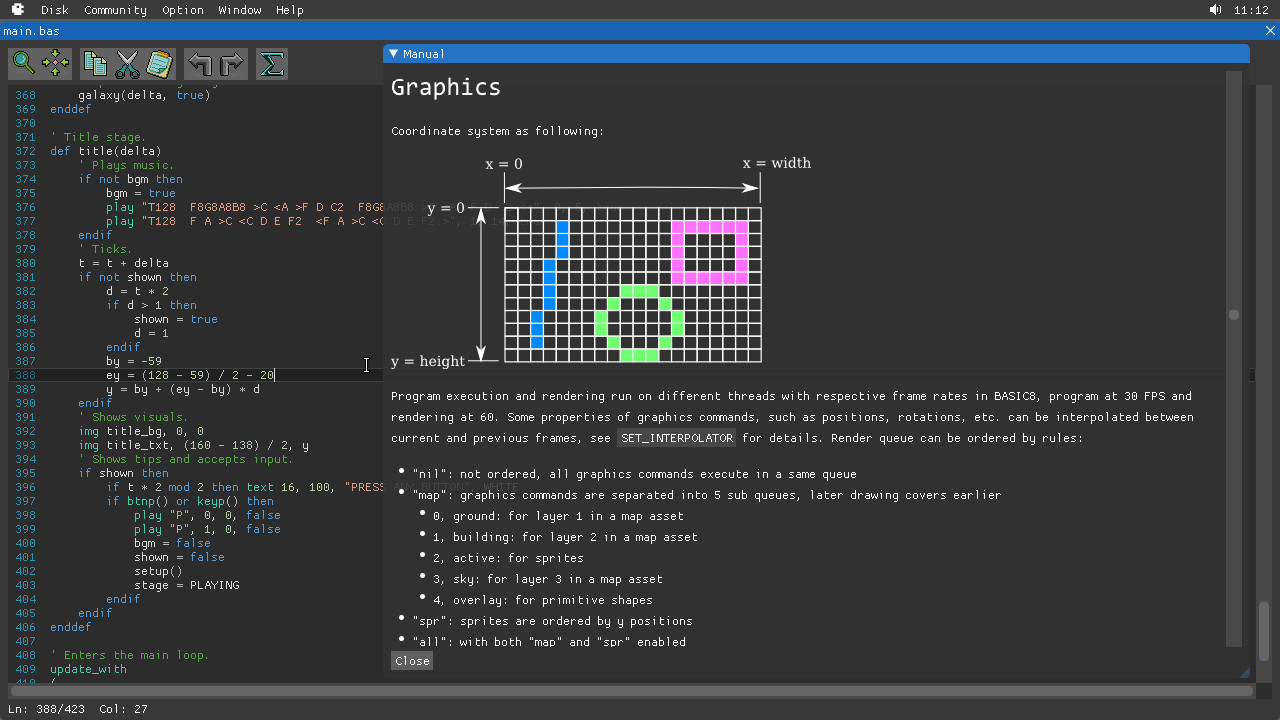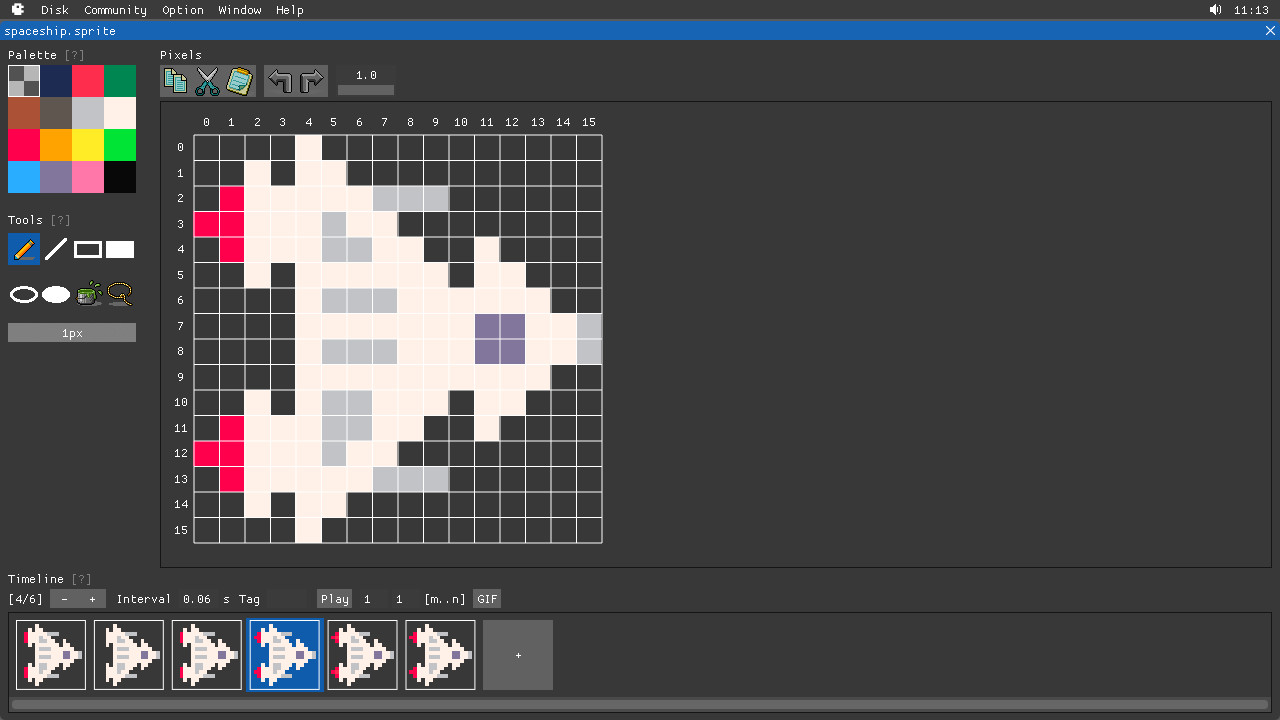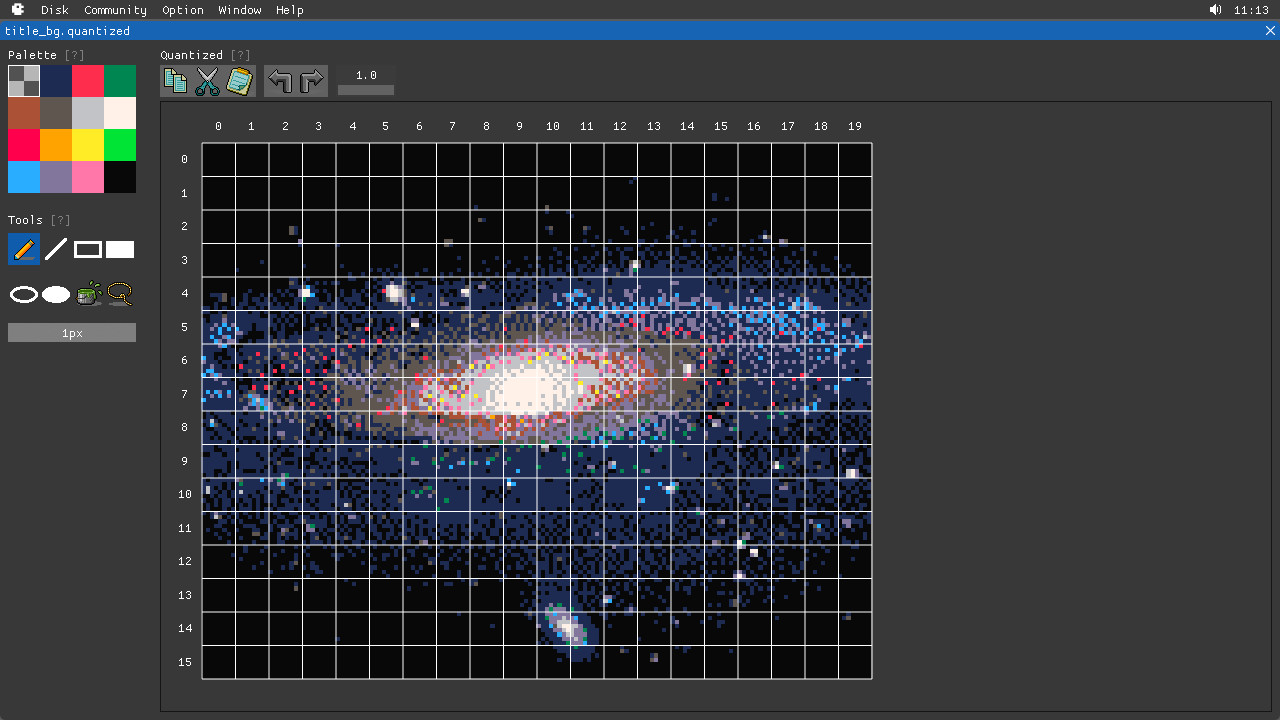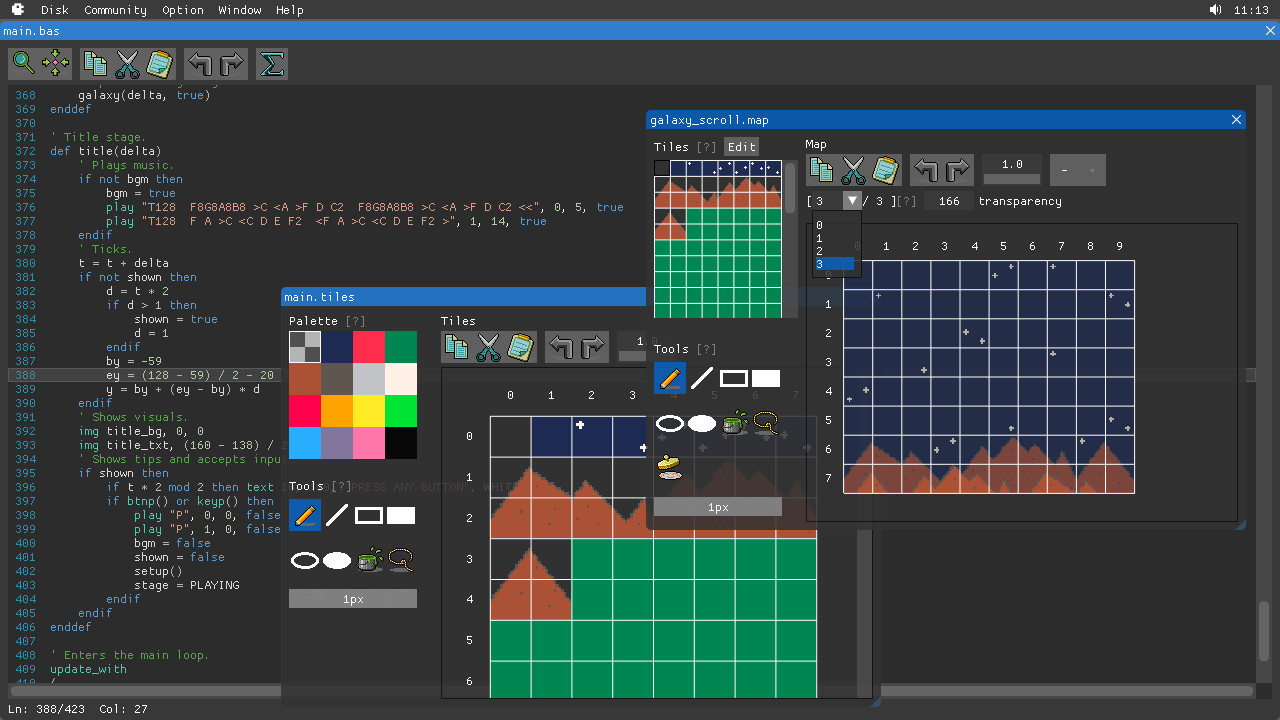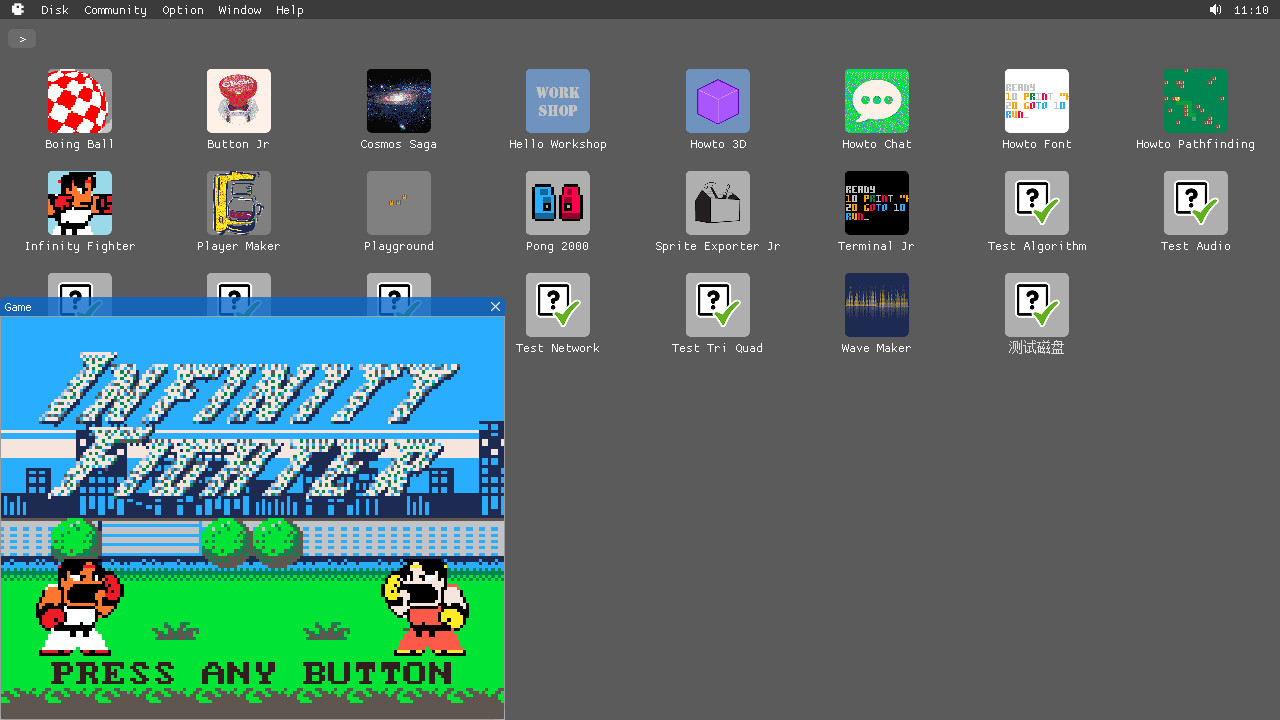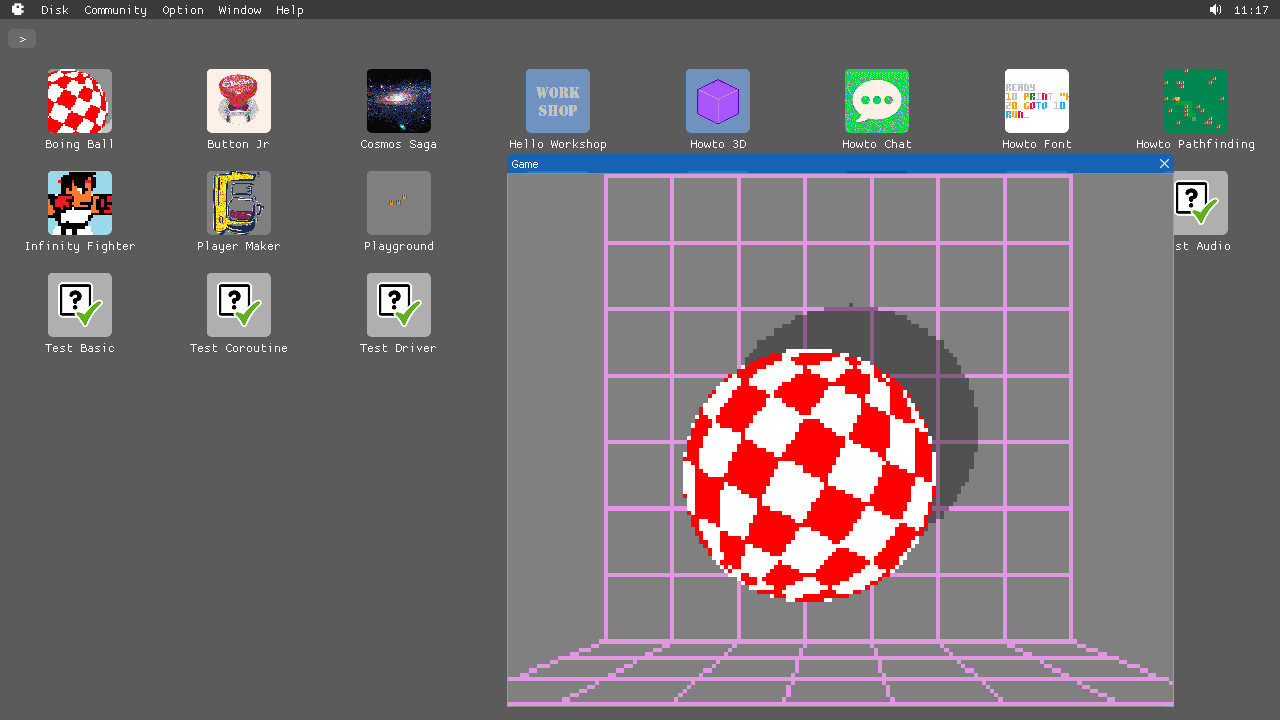
Разработчик: Tony Wang
Описание
Sharing
Share your creative disks via Workshop using built-in tools, and play others' creations.
Redistributing
Make redistributable standalone player for Windows, MacOS and Linux with the Player Maker, and for browsers with the HTML Maker.
About the Software

BASIC8 is an integrated Fantasy Computer for game and other program development. You can create, share and play disks in a modern BASIC dialect, with built-in tools for editing sprite, tiles, map, quantized, etc. It's been a while since we used to enjoy coding and playing straightforward after a computer bootup. The goal of BASIC8 is bringing a sense of joy back from retro/vintage computing and gaming, also being quick at getting higher level stuff done for contemporary development for everyone.
Click "View the manual" or "Visit the website" on the right side of this page to get full details (it's above instead of right side on small mobile screen); or learn more.
READY
- Handy sharing via Workshop with built-in tools
- Disk can be made into standalone player with the Player Maker and HTML Maker
- Disk can be saved as "*.b8" file, "*.png", or text based for sharing
- Programmable in an easy to learn BASIC dialect with both retro and modern syntax
- Easy to use API for graphics, input, audio, and more other facilities
- Visualized built-in tools for editing sprite, tiles, map, quantized, etc.
- Visualized Wave Maker for making sound effect
- Easy to bring your own tools
- More features coming...
SPECS
- Display: 160x128 pixels
- Audio: 2 music channels, 1 MIDI channel, 4 sound effect channels, 1 speech channel
- Code: BASIC (structured/prototype-based/functional)
- Graphics: up to 65535 drawing commands per cycle
- Palette: 16 colors with transparency support
- Sprite: up to 32x32 pixels per frame, up to 512 frames per sprite
- Tiles: 240 cels
- Map: up to 128x64 tiles per layer, up to 4 layers (including a layer of logic mark) per page
- Gamepad: 6 buttons for each pad (D-Pad + A/B), up to 8 players
- Keyboard and mouse: supported
LANG
- Case-insensitive; but no line number in BASIC8
- Built-in LIST and DICT
- Structured sub routine definition with the DEF/ENDDEF statements
- LAMBDA expression enhanced
- Prototype-based CLASS paradigm
- With both manually and automatically dispatched COROUTINE
- Importing multiple source files with the IMPORT statement
- Automatic releasing of referenced objects by GC
- Built-in libraries for File, IO, JSON, Matrix, Network, Web, etc.
- No limitation for file quantity (code, sprites, maps, etc.)
- More advantages to be discovered...
Поддерживаемые языки: english
Системные требования
Windows
- OS *: Windows 7 or later (32/64bit)
- Processor: Atom 1.44GHz
- Memory: 512 MB RAM
- Graphics: Intel HD
- Storage: 50 MB available space
- OS: CosmOS 1.0
- Processor: Quantum
- Memory: 38911 GB RAM
- Graphics: Dark matter
- Storage: 50 MB available space
Mac
- OS: MacOS X 10.7 or later (64bit)
- Processor: Core 2 Duo 1.83GHz
- Memory: 512 MB RAM
- Graphics: Intel HD
- Storage: 50 MB available space
- Additional Notes: For Intel-based CPU
- OS: CosmOS 1.0
- Processor: Quantum
- Memory: 38911 GB RAM
- Graphics: Dark matter
- Storage: 50 MB available space
Linux
- OS: Ubuntu (32/64bit)
- Processor: Core 2 Duo 1.83GHz
- Memory: 512 MB RAM
- Graphics: Intel HD
- Storage: 50 MB available space
- OS: CosmOS 1.0
- Processor: Quantum
- Memory: 38911 GB RAM
- Graphics: Dark matter
- Storage: 50 MB available space
Отзывы пользователей
Very lacking:
- Does not support line numbers (You cannot type 60 GOTO 20)
- Does not support direct input (You can only edit and run the code)
- Does not have an output text monitor (You cannot use PRINT)
- Graphical interface (You cannot use OPEN FILENAME)
Remember the nostalgia of old computers? ...No no no not that old Dell PC.. i mean that old ZX81.. well computers (Yes.. computers, not consoles) like that could be programmed in a language called 'Basic' which people used to make various things from programs to games & demos.
Well.. this is another variation on that Basic language, its a Basic Language IDE, You provide the code & Art.. put in effort ..an it will compile your game for you to play o other systems.
But Basic is slow dude... Well.. yes & no... it isn't the fastest language, however with today's PCs being much faster than the ones we had in the 80s loading times should be no problem so things should run smoothly.
Why i bought this software?..
I basically bought this so i can learn Basic programming language on a new machine, new OS & maybe (not sure if i can) import old cold from varius places such as old books) to see what happens and what can be made.
The PRINT funtion does not display on the main screen. You have to use the text function and the text is HUGE. I need a programming language that does complex calculations within a loop and can print the answers to the main screen.
Easy to learn, standardized virtual computer (fixed screen size, standard virtual controllers), runs on potato hardware, lightweight.
But even though that the fixed screen size is one of its pros, I think that the 160x128 screen is a bit limited. would have loved a 640x480 size instead.
If you love retro game programming, you'll love BASIC8. What it's not: This is not an IDE to create content for Windows, Mac or Ubuntu Linux but it's a fantasy console that runs on all of those platforms. It has all the limitations of a system console from the late 1980s so don't expect to take advantage of modern system resources. That being said, if it works on BASIC8 for Windows then it will work on Linux and Mac with no changes to the code. It's fun and if you love BASIC from that era, you'll love this.
After a while this program is great but only if you know how to program already because of the high learning curve the hardest challenge was finding information that is why i made a guide to help my self and other i do recommend this but only if you know some programming
I love these fantasy computers
I really wanted to like BASIC8 due to the old-school feel, the easy BASIC dialect, the wonderful inbuilt sprite and map editors and detailed manual that it comes with, but the incessant crashing made it way too difficult and frustrating to work with. If I'm having to reboot the software (and worse, sometimes Steam itself after going down) almost every time I run it (I can confirm that this happens across multiple systems for me), it really cuts down on quality coding time and ruins my flow.
I guess for me, it'll be back to Pico-8, QB64 and others that don't shut down on me every time I run the program. But I could absolutely see BASIC8 being incredible in the future, and I have high hopes for it.
I really like the idea of BASIC8, but there are literally no tutorials that i can find. There is some okay documentation in the engine's/computers manual. but its kind of lacking as well. For instance, i was reading through it and found a message box command, so i tried it out "MSGBOX("Hello")" this worked , however there was no further documentation in regards to how to use the message box. so the message box and message would pop, up but i had no idea how to write something to interact with the "ok" button on the message box. which left me with a program i couldnt close or do anything with besides dragging the message box around, i couldnt even close my program.
this thing really needs more documentation / tutorials similar to what you'd see when learning python. i'd only recommend the software if you're already experienced with the BASIC language and want to make some retro style games for fun.
Requires you to already know BASIC
I love this tool! I started programming back in QBASIC on DOS when I was 14 and I love that this is available on steam to bring back those retro days of BASIC programming. There are other free BASIC dialects but I think it's super convenient that this tool allows easy sharing of what users make.
A little bit of retro game programming
You can have some days of casual coding in it, remembering the times when creating an arcade game was about inventing something yourself instead of searching for the right libraries.
The manual is good. Some say it isn't enough, well I'll say if you plan to be a developer, you should learn to read this kind of thing: not videos or some entertaining book, but the manual.
The syntax is straightforward, pretty much like in any other language. It's also readable: as a python developer, I'm a big fan of not declaring the types of variables and using TAB indentation instead of brackets. It helps in developing a good habit of writing readable ("clean") code. So this product can actually be used as a beginner to get used to some programming patterns, and thank God it's not some C++ or C#.
It's also real programming, not some fictional language which will never go outside of the 'game' it was used into. The question why use this instead of something else is debatable, but you can actually use the code you write here in the bigger projects in more professional IDEs. You can read about it here:
https://github.com/paladin-t/my_basic
Things get relatively complicated after you got to the point of making graphics. First of all, this product has some handy functions (methods/coroutines) already built-in. What you'll read in the graphics sections of the manual is the description of the so-called "standard library" of this Basic8 package, which isn't part of the syntax, but instead, little programs which written on it which you can call by using just one word. This means these things aren't written in stone, and you can just make your own instead, don't worry to memorize them all just remember what can be done and return to the manual when you'll need that thing. That's the way coders operate, especially when learning a new language/big library.
So, if you're into it, then...
It's a good time and place to learn about matrix algebra and how it relates to 3D
And no, it's not boring, it's fascinating. Not that BS you were tortured by in the school.
You'll need it to understand the principles of graphics. And not be just another dumb Unity copycat.
Some things to start with:
There's an interesting channel about matrices on YouTube. To get you the right idea:
https://www.youtube.com/watch?v=kYB8IZa5AuE
(probably worth checking out the entire playlist)
Also, it might be interesting for some to learn about different types of projections:
https://en.wikipedia.org/wiki/3D_projection
Yep, not all 3D graphics you see is the same.
And then, of course, continue learning. It's not about just Basic8, it will really come in handy if you are interested in the development of any applications with 3D graphics, even if you'll use existing libraries without writing math in code yourself.
One more thing to note is that the standard functions are already optimized for GPU. This is big because in the old days your graphics were either CPU-only, or you spend more effort to put some of it on GPU, which often added a significant amount of work to the small arcade game, and therefore was often ignored because CPU is fine even for some pseudo-3D graphics.
I wasn't optimistic about this thing, especially when there's so much junk cash grab unity software in Steam. This turns out to be quite interesting and quality software (I like this all-in-one desktop with fullscreen option). Even though, of course, I wouldn't call it a fully-featured development environment...
Fairly easy to use if you have a small amount of programming knowledge. I personally have none but still have found this program to be a great tool in creating a game.
First of all: If you have never ever programmed something before, don't start here. It'll be a bit too much, and there aren't a lot tutorials and resources regarding Basic8 out there, which will make learning it as an absolute beginner very hard.
That being said: Basic8 just works.
- The UI and windowed approach is very nice, as I can use my whole screen to edit sprites, code and run/debug a game/program at the same time
- The Docs are amazing, very straight forward an clutterfree
- Feature wise it's got everything you need to make 2D or even 3D games
- maybe a simple music-editor would be a nice addition, as the build-in tools use MML and that can be a bit annoying to manage
- The limitations help a lot to focus on what's important
- The Dev is still active, that's a huge plus
So, what can you use Basic8 for?
Basically anything. That's also a bit of a downside, as you have to write a lot of functions that are usually a given in modern GameEngines. That can be time consuming, especially if your math-skills are a bit on the weaker side, but you can and will manage, if you're willing to put in the time to learn a lot of basic stuff.
All in all i can only recommend Basic8.
Basic8 is better than Pico8, Basic8 is being developed further, Pico 8 has not been developed for a long time.
Thanks for the continued development,
I love Basic 8
PROS:
- This is an OO and feature rich programming language with pretty much everything you need to make many applications and games
- With disks created by the Dev you can export applications as disks(Basic8s executable), Desktop OS executables and HTML web players
- Comes with simple tools for making images, sounds and more
- Can be extended with custom plugins
- The dev is awesome, provides great support and most of the workshop content!
CONS:
- The application is basically a very simple IDE, think Python's IDLE but a little more in some aspects although not all
- If you were expecting a fantasy computer, this is more of an IDE. There isn't really much to do with a computer other than the disk executables but one could argue that this is like Java and Jars (aka a virtual machine) and not really a simulated computer.
- The font settings for the editor are a little bit terrible, 1 setting for ALL fonts both in the editor window and UI. I'm hoping the dev will add a second slider to fix this.
- I wish all the extra windows didn't open up inside the window, meaning occluded if dragged off the main window. Just turn off multi-windows trust me.
-Resolution is extremely limited to 128 X 160, this is to go along with the fantasy computer stuff I guess but just feels very limiting and should definitely be a setting to turn off or on
SUMMARY:
Over all this is a very cool language with tons of features and great tools with lots of room for expand-ability. However it is held back by the "Fantasy Computer" aspects that it has thrown in there for not a lot of reasons I can see as useful or productive. I feel like you could make a great Basic8 IDE in Basic8 and totally abandon the base software to gain a better IDE (if the resolution wasn't so rediculously limited). I do recommend this though, you can do a lot and have fun doing it! Nice software!
they should add more programming languages to this
Very good for begginers and pros, only downside is that there a not a lot of tutorials on the web.
great peice of software,you truly can do anything with it if you put enough time into it my only complaint is that you really cant do much in terms of graphics other than that its great to do whatever you so please
this is a great software overall but as a fantasy console it's lacking some features like actually limiting the memory and having it's own operating system or something like that, another neat feature that this should have is different graphical modes like a terminal mode or a high-res(with a lower capacity of sprites and colours) and low-res(faster and more colours), this looks more like an actual game developing software with a few limitations rather than a fantasy console.
the price is a little too high, i think that more people would want to buy this if it was priced at ~8$, but i do recommend to buy it when it goes to sale
It is very fun to make programs. Makes you feel like your programming on an old time computer.
Дополнительная информация
| Разработчик | Tony Wang |
| Платформы | Windows, Mac, Linux |
| Ограничение возраста | Нет |
| Дата релиза | 17.01.2025 |
| Отзывы пользователей | 73% положительных (22) |


